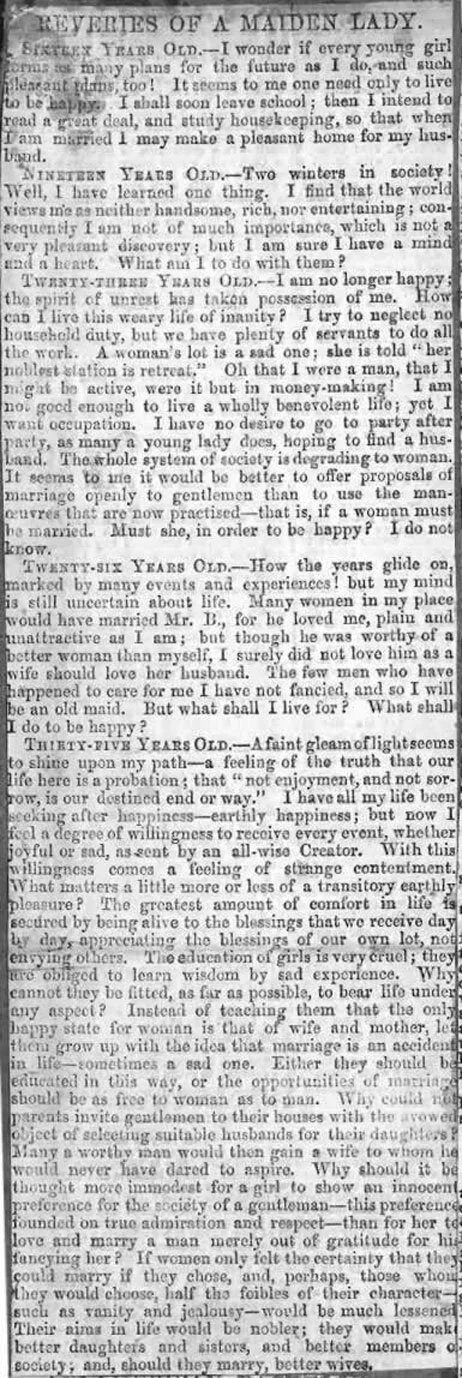REVERIES OF A MAIDEN LADY.
SIXTEEN YEARS OLD. – I wonder if every young girl forms as many plans for the future as I do, and such pleasant plans, too! I shall soon leave school; then I intend to read a great deal, and study housekeeping, so that when I am married I may make a pleasant home for my husband.
NINETEEN YEARS OLD. - Two winters in society! Well, I have learned one thing. I find that the world views me as neither handsome, rich, nor entertaining; consequently I am not of much importance, which is not a very pleasant discovery; but I am sure I have a mind and a heart. What am I to do with them?
TWENTY-THREE YEARS OLD. – I am no longer happy; the spirit of unrest has taken possession of me. How can I live this weary life on inanity? I try to neglect no household duty, but we have plenty of servants to do all the work. A woman’s lot is a sad one; she is told “her noblest station is retreat.” Oh that I were a man, that I might be active, were it but in money-making! I am not good enough to live a wholly benevolent life; yet I want occupation. I have no desire to go to party after party, as many a young lady does, hoping to find a husband. The whole system of society is degrading to woman. It seems to me it would be better to offer proposals of marriage openly to gentlemen than to use the manoeuvres that are now practised – that is, if a woman must be married. Must she, in order to be happy? I do not know.
TWENTY-SIX YEARS OLD. – How the years glide on, marked by many events and experiences! But my mind is still uncertain about life. Many women in my place would have married Mr. B., for he loved me, plain and unattractive as I am; but though he was worthy of a better woman than myself, I surely did not love him as a wife should love her husband. The few men who have happened to care for me I have not fancied, and so I will be an old maid. But what shall I live for? What shall I do to be happy?
THIRTY-FIVE YEARS OLD. – A faint gleam of light seems to shine upon my path – a feeling of the truth that our life here is a probation; that “not enjoyment, and not sorrow, is our destined end or way.” I have all my life been seeking after happiness; but now I feel a degree of willingness to receive every event, whether joyful or sad, as sent by an all-wise Creator. With this willingness comes a feeling of strange contentment. What matters a little more or less of a transitory earthly pleasure? The greatest amount of comfort in life is secured by being alive to the blessings that we receive day by day, appreciating the blessings of our own lot, not envying others. The education of girls is very cruel; they are obliged to learn wisdom by sad experience. Why cannot they be fitted, as far as possible, to bear life under any aspect? Instead of teaching them that the only happy state for woman is that of wife and mother, let them grow up with the idea that marriage is an accident in life – sometimes a sad one. Either they should be educated in this way, or the opportunities of marriage should be as free to woman as to man. Why could not parents invite gentlemen to their houses with the avowed object of selecting suitable husbands for their daughters? Many a worthy man would then gain a wife to whom he would never have dared to aspire. Why should it be thought more immodest for a girl to show an innocent preference for the society of a gentleman – this preference founded on true admiration and respect – than for her to love and marry a man merely out of gratitude for his fancying her? If women only felt the certainty that they could marry if they chose, and, perhaps, those whom they would choose, half the foibles of their character – such as vanity and jealousy – would be much lessened. Their aims in life would be nobler; they would make better daughter and sisters, and better members of society; and, should they marry, better wives.
